Working together for pharmacy's future
In Interviews
Follow this topic
Bookmark
Record learning outcomes
P3 speaks to the National Pharmacy Association’s Ian Strachan about unity in the sector and the fight for the future of independents

The National Pharmacy Association has a set of core beliefs (see box) for community pharmacy, which it wants the whole sector to align with. Ian Strachan, NPA chairman, tells P3 about why being clear about what the sector stands for is so important.

“Our core beliefs are really necessary – everyone needs to understand what we stand for. We are defending face-to-face contact with patients, because we genuinely do believe that is the solution. And the idea that you couple supply with services – that’s fundamental.
"We’ve also absolutely committed to the integrity of pharmacists as professionals having clinical responsibility for the pharmacy. Preserving the integrity of pharmacists as professionals, that’s what we stand for. Then face to face – the bricks and mortar network – the linking of supply and services, those are the foundations for community pharmacies as the NPA sees it. And the potential is there for it to do so much more.”
Changing the message
A key focus for the NPA this year will be to raise its status in terms of being a spokesperson for the sector, he says. “I think there is some credence in that. I do think we should take on that mantle and that we have a mandate for that.“
Getting the message about community pharmacy over to lobbyists, journalists and politicians is more important than ever, he says.
The team at the NPA wants to see pharmacy in the spotlight more often. “We’ve created a lobbying team of our own. I want to see pharmacy on the front page. It’s a wonderful profession this, full of dedicated people who are hard working and professional in the way they do their job. It’s a network that can deliver a lot more than it is now, and could be a solution to so much more of the demands, efficiencies and capacity issues that exist across other parts of the health service.
“We need to ensure people get an objective assessment of pharmacy. Far too often you hear about pharmacy being reported on, but you don’t often enough see the real experts and people’s real opinions from the sector.”
Creating the ‘right messaging’ about community pharmacy is vital, he stresses.
“There’s so much more that pharmacy can do if its potential was liberated. But the whole sector has played a game for years of responding to an agenda set by others, rather than what we think is achievable and is in the best interests of patients. That’s the kind of dialogue we want to get to.”
“We’ve created a sector think tank – reaching out to whoever can influence, interject and improve outcomes. It’s a style of working that we’ve used for some time, and helps give us the right strategies.”
The NPA is trying new ways of working to get results, says Mr Strachan.
“We are working to influence STPs, to look to see what projects we can seed and kick start so they happen, rather than just wait and see. We are looking to influence the STP agenda, by getting the evidence base, so they can see what we can do.”
Challenging perceptions
“Pharmacy needs to be influencing and shaping, and that’s not going to happen until we’ve got a stronger presence at Westminster and MPs understand us better. That’s one of the benefits that came out of last year’s petition – we made an inroad. That’s our ambition now – and we’ve got to make it happen.
Are there particular negative beliefs about community pharmacy with the Department of Health to overcome? “I think a major obstacle has been a misguided belief that the sector is swimming in cash and that we can ride this out – I don’t think that’s true at all. Another one is that pharmacy is failing its clinical milestones. That shows a lack of understanding of what we do.”
“The Judicial Review highlighted that there is a lot of naivety in government. They don’t seem to value the potential for pharmacists to intervene – in adherence, optimisation or influencing patient behaviour. But there isn’t anyone better at influencing patient behaviour than the community pharmacist, there really isn’t,” he suggests.
“The idea that pharmacy is resistant to change is just nonsense. They are adaptable and innovative, and certainly can respond in a way that I find really entrepreneurial.”
“Right now there is a mindset that does not see community pharmacy as a solution. The biggest cliché going around at the moment is the clinical pharmacist – and its completely unjustified. It’s such a destructive cliché – it does remove the opportunity to develop the skills and develop the network.”
Independents under stress
And how is the independent pharmacy sector finding it now that the funding cuts in England are in place? It actually feels worse than expected, says Mr Strachan.
“I think the cuts feel deeper than what’s projected. There is a feeling out there that there is more coming out of margin than perhaps imagined, and that it’s worse than the projections. Clearly there’s a reduction in fees and we can calculate that – but it does feel harder. It feels like there’s something else going on. If we can get through the next couple of months there’s some light there.”
“I think there is a lot of feeling of unknown and of uncertainty,” he concludes.
